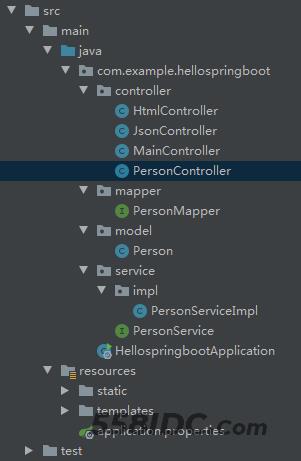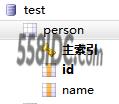目录
- 1. 创建数据表
- 2. 打开 pom.xml,添加相关依赖
- 3. 给application.properties添加数据库配置
- 4. 新建 model/Person
- 5. 新建 mapper/PersonMapper
- 6. 新建 service/PersonService 接口及其实现类 service/impl/PersonServiceImpl
- 7. 新建 controller/PersonController
- 8. 使用Postman测试结果
接上回
上一篇我们简单介绍了基于SpringBoot实现简单的Web开发,本节来看Web开发中必不可少的内容——数据持久化
先看项目结构:

1. 创建数据表
打开mysql,打开数据库 test (没有可以创建一个),创建表格 person
给 person 表创建两个字段 id、name


2. 打开 pom.xml,添加相关依赖
<!-- 引入mybatis、mybatis-plus、mysql等依赖 -->
<dependency>
<groupId>org.mybatis.spring.boot</groupId>
<artifactId>mybatis-spring-boot-starter</artifactId>
<version>2.2.2</version>
</dependency>
<dependency>
<groupId>com.baomidou</groupId>
<artifactId>mybatis-plus-boot-starter</artifactId>
<version>3.5.2</version>
</dependency>
<dependency>
<groupId>mysql</groupId>
<artifactId>mysql-connector-java</artifactId>
</dependency>
mybatis-spring-boot-starter 满足了 mybatis在springboot下的拆箱即用
mybatis-plus-boot-starter 实现了 mybatis-plus 的自动化配置,同样拆箱即用
注意:是mybatis-plus-boot-starter,不是mybatis-plus;前者包含后者的引用,如果只引用后者执行程序会报错!
由于mybatis-plus是基于mybatis的,所以两者引用缺一不可
mysql-connector-java 是基础的mysql驱动接口,这个也是不可或缺的
mybatis是安全、优秀的java持久层框架,基于xml可灵活定制sql语句
mybatis-plus在mybatis的基础上做了更进一步的简化,可免去xml编写
同时,mybatis-plus遵循非侵入式设计的原则,即完全兼容原mybatis的使用习惯,非常方便
3. 给application.properties添加数据库配置
# mysql相关设置 spring.datasource.username=admin spring.datasource.password=admin spring.datasource.url=jdbc:mysql://localhost:3306/test?useSSL=false&useUnicode=true&characterEncoding=utf-8&serverTimezone=GMT%2B8 spring.datasource.driver-class-name=com.mysql.cj.jdbc.Driver
到这里可能有人会问,咋没看到mybatis.xml的配置?不是一般都会有一句:
#指定Mybatis的Mapper文件 mybatis.mapper-locations=classpath:mapper/*xml
如果我们使用mybatis的原生功能,这一句配置是需要加上的,但是如果我们基于mybatis-plus,可以先不加这一句,因为它是免xml配置的!
4. 新建 model/Person
package com.example.hellospringboot.model;
public class Person {
private Integer id = 0;
private String name = "";
public Integer getId() {
return id;
}
public void setId(Integer id) {
this.id = id;
}
public String getName() {
return name;
}
public void setName(String name) {
this.name = name;
}
}
注意:类名 Person 要和数据库表名 person 一致(首字母大写是Java的类命名规则,这个没有问题)
id和name两个字段的名称和类型也要和数据库保持一致
5. 新建 mapper/PersonMapper
package com.example.hellospringboot.mapper;
import com.baomidou.mybatisplus.core.mapper.BaseMapper;
import com.example.hellospringboot.model.Person;
import org.apache.ibatis.annotations.Mapper;
import org.springframework.stereotype.Repository;
@Mapper
@Repository
public interface PersonMapper extends BaseMapper<Person> {
}
这里让PersonMapper继承自mybatis-plus提供的BaseMapper,这是启用mybatis-plus免xml特性的关键!
BaseMapper为我们定制常用的数据库增删改查的方法,直接继承使用即可!
6. 新建 service/PersonService 接口及其实现类 service/impl/PersonServiceImpl
package com.example.hellospringboot.service;
import com.example.hellospringboot.model.Person;
import java.util.List;
public interface PersonService {
Integer insert(Person person);
Integer update(Person person);
Integer delete(int id);
List<Person> select();
}
package com.example.hellospringboot.service.impl;
import com.example.hellospringboot.mapper.PersonMapper;
import com.example.hellospringboot.model.Person;
import com.example.hellospringboot.service.PersonService;
import org.springframework.beans.factory.annotation.Autowired;
import org.springframework.stereotype.Service;
import java.util.List;
@Service
public class PersonServiceImpl implements PersonService {
@Autowired
PersonMapper mapper;
public Integer insert(Person person){
return mapper.insert(person);
}
public Integer update(Person person){
return mapper.updateById(person);
}
public Integer delete(int id){
return mapper.deleteById(id);
}
public List<Person> select(){
return mapper.selectList(null);
}
}
我们给mapper新增了@Repository注解,可以让Service自动装载Mapper不报错
通过代码我们可以看到,继承自BaseMapper<Person>的PersonMapper,不加任何代码不写任何xml,就可以支持Person数据模型的常见的增删改查等操作,真的非常方便!
7. 新建 controller/PersonController
package com.example.hellospringboot.controller;
import com.example.hellospringboot.model.Person;
import com.example.hellospringboot.service.PersonService;
import org.springframework.beans.factory.annotation.Autowired;
import org.springframework.web.bind.annotation.GetMapping;
import org.springframework.web.bind.annotation.PostMapping;
import org.springframework.web.bind.annotation.RequestMapping;
import org.springframework.web.bind.annotation.RestController;
import java.util.List;
@RestController
@RequestMapping("/person")
public class PersonController {
@Autowired
PersonService service;
@PostMapping("/insert")
public Integer insert(Person person){
return service.insert(person);
}
@PostMapping("/update")
public Integer update(Person person){
return service.update(person);
}
@PostMapping("/delete")
public Integer delete(int id){
return service.delete(id);
}
@GetMapping("/select")
public List<Person> select(){
return service.select();
}
}
我们这里使用了@RestController注解,这样可以非常方便的测试我们的业务逻辑
这里可以看到,insert、update、delete三个写方法我们使用了Post协议,select读方法使用了Get协议
其实标准的RestApi风格另外还有Put和Delete协议,这里其实没有严格的规定
由于Get协议的参数是直接暴露在url串里的,所以一般写方法我们不建议使用Get协议
8. 使用Postman测试结果






我们在请求参数中分别传入id和name,springboot框架会自动将其拼装成Person对象,真的是非常智能化!
另外,得益于mybatis-plus免xml的特性,我们不用自己手写任何的xml逻辑实现,甚至通篇未出现任何大家常见的mybatis相关配置!
以上。
本节内容我们介绍了数据持久化的相关操作,并且是基础传统的关系型数据库——mysql
到此这篇关于SpringBoot整合mybatis/mybatis-plus实现数据持久化的文章就介绍到这了,更多相关SpringBoot mybatis-plus数据持久化内容请搜索自由互联以前的文章或继续浏览下面的相关文章希望大家以后多多支持自由互联!
